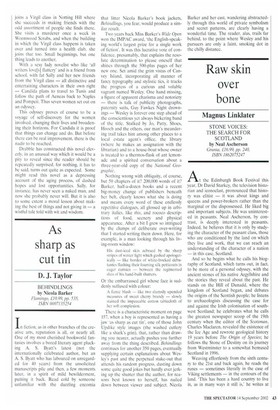As sharp as cut tin
D. J. Taylor
BEHINDLINGS by Nicola Barker Flamingo, 110.99, pp. 535, ISBN 0007135254 In fiction, as in other branches of the creative arts, reputation is all, or nearly all. One of my most cherished bookworld fantasies involves a bored literary agent plucking A. S. Byatt's latest (not the internationally celebrated author, but an A. S. Byatt who has laboured on unregarded for 40 years) from the unsolicited manuscripts pile and then, a few moments later, in a spirit of mild bewilderment, putting it back. Read cold by someone unfamiliar with the dazzling encomia
that litter Nicola Barker's book jackets, Behindlings, you fear, would produce a similar result.
Two years back Miss Barker's Wide Open won the IMPAC award, 'the English-speaking world's largest prize for a single work of fiction'. It was this lucrative vote of confidence, presumably, that explains the resolute determination to please oneself that shines through the 500-plus pages of her new one. Set amid the grim vistas of Canvey Island, incorporating all manner of fancy typography and stylistic tics, it tracks the progress of a curious and voluble vagrant named Wesley. One hand missing, a figure of apparent charisma and notoriety — there is talk of publicity photographs, paternity suits, Guy Fawkes Night drownings — Wesley is forever one step ahead of the conscientious yet always bickering band of the title. Stalked by Jo, Patty, Shoes, Hooch and the others, our man's meandering trail takes him among other places to a local estate agent's office, the library (where he makes an assignation with the librarian) and to a house-boat whose owner is treated to a thermos-flask of ant lemonade and a spirited conversation about a three-year-old copy of the National Geographic.
Nothing wrong with obliquity, of course, but 50 chapters of it? 200,000 words of it? Barker, half-a-dozen books and a recent big-money change of publishers beneath her belt, clearly knows what she is doing and means every word of these endlessly repetitive dialogues, all glossed up in arbitrary italics, like this, and rococo descriptions of food, scenery and physical appearance. After a bit I grew so intrigued by the clumps of deliberate over-writing that I started writing them down. Here, for example, is a man looking through his living-room window:
His dust-iced skin zebraed by the sharp stripes of winter light which gushed apologetically — like hordes of white-frocked debutantes flashing their foaming silk petticoats in eager curtsies — between the regimented slats of his hand-built shutters.
Or the embarrassed girl whose face is suddenly suffused with colour:
A fierce blush — like two clumsily upended measures of sweet cherry brandy — slowly stained the impeccable cotton tablecloth of her soft complexion.
There is a characteristic moment on page 157, when a boy is represented as having a jaw as sharp as cut tin', one of those John Updike style images (the washed cutlery like a shark's grin), that, rather than drawing you nearer, actually pushes you further away from the thing described. Behindlings continues for another 350 pages, eventually supplying certain explanations about Wesley's past and the perpetual stake-out that attends his random progress, dusting down some quite good jokes but hardly ever jerking up the shutter that the author, for reasons best known to herself, has nailed down between viewer and subject. Nicola Barker and her cast, wandering abstractedly through this world of private symbolism and secret patterns, are clearly having a wonderful time. The reader, alas, trails far behind, to the point where Wesley and his pursuers are only a faint, smoking dot in the chilly distance.










































































 Previous page
Previous page